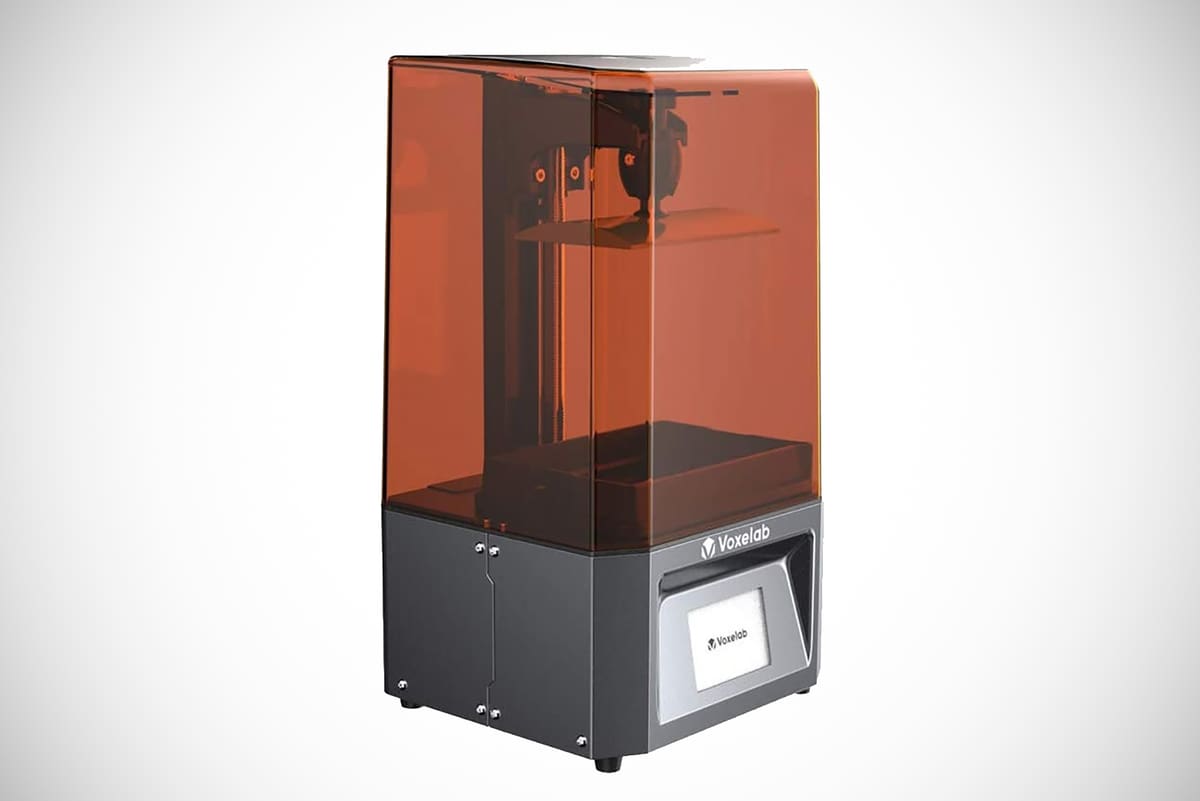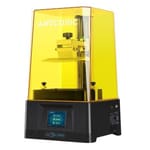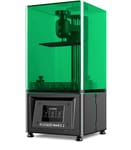The brand name Voxelab doesn’t ring a bell? Although being fairly new to the 3D printing industry, the company is actually a sub-brand of 3D printing giant Flashforge. The company, best known for enclosed prosumer FDM machines, branches out to also get a foothold in the juicy budget resin printer market.
With its Proxima release, Voxelab wants to go toe to toe with the established top dogs like Elegoo or Anycubic right away. But does it have what it takes to stay afloat in the crowdy resin vat?
We took a look at the specs to find out. Here is what we know about the 3D printer so far.
Features
Mono Screen
Monochrome screens used to be a benchmark not so long ago but have quickly become the standard. So, to no surprise, we also find one on the Voxelab Proxima. Allowing more light to pass through, it’s the mono panels that brought curing times down from half a dozen seconds to 1-2 seconds per layer. That and the fact that they last about four times longer due to less light exposure made resin 3D printing all the more exciting. Well, faster and cheaper at least. In any case, with the 6-inch mono screen at its heart, the Proxima is up to date.
According to the manufacturer, the Proxima is also equipped with an improved light reflector for an even distribution of light across the panel, which we cant confirm from looking at the spec sheet. Still, it is definitely something that you’d want in a resin 3D printer to guarantee uniform curing across the whole plate.
Build volume and Resolution
Resolution wise the Proxima is in the realm – one could say in close proximity – of similar budget resin printers, with a standard 2K, 6-inch screen housing 2560 x 1620 pixels. This allows the Proxima to print at an XY accuracy of 50 microns, which, again, is pretty standard, and we don’t mean it in a bad way. Unless someone goes for an odd-ball (like the Phrozen Sonic Mini 4K), you will find almost identical specs across the category.
Build volume on the Proxima is 130 x 82 x 150 mm, which is slightly more than first-generation pioneers such as the original Mars have and similar to recent printers such as the Anycubic Photon Mono.
Slicer
The Voxelab Proxima comes with its own slicer while also being compatible with non-proprietary slicers such as ChiTuBox. From the looks of it, the VoxelPrint slicer software is a rebranded version of its mother company’s slicer FlashPrint. As Vocelab is fairly new, we have yet to get hands-on experience with the software, but generally, we don’t mind companies bringing out their own slicer versions (as long as they work properly, which most do, to be fair), but we always welcome the possibility not to get hunkered down to one choice but to choose according to one’s preference.
Further Features
Additional features on the Voxelab Proxima are:
- Dual linear rails – ensure steady Z-axis movement and eliminates possible print artifacts
- Manual bed leveling – as all resin 3D printers do, the Proxima has a manual leveling system by homing the plate onto the screen with a sheet of paper in between. A quick and foolproof way to get started.
- Resin Vat Max scale mark – a handle little fill indicator showing you the maximum amount of resin to be poured into it before you risk spillage during operation. Better have and not need then need and not have.

Price
The Voxelab Proxima was released in late 2020 and is available through a number of retailers around the globe. Price-wise it will set you back ~$210 at the time of writing, which is a fairly competitive price; surely looking to cut some ground under the competitor’s feet.
Seeing as the output and handling of these resin printers is almost identical across the board, the price can be a strong indicator for a purchasing decision. With more and more budget machines flooding the market, we wouldn’t be surprised if prices drop even further down the road.

Reviews
The Voexelab Proxima has been out for a few months now, and first reviews and feedback can be found online. Through the usual channels, mainly Reddit and Youtube reviewers of the Voxelab Proxima seem to be generally happy with the machine’s performance attesting it a good value for your money. Some customers have pointed out that the font used in the printer menu is sometimes hard to read, as the touchscreen is rather small, and so is the font size, but printing performance seems to be on par, making the Proxima a viable contender.

Tech Specs

General Specifications
- Technology: LCD
- Type: Resin
- Year: 2020
- Assembly: Fully assembled
- Manufacturer: Voxelab
- Country: China
3D PRINTING SPECIFICATIONS
- Build Volume: 130 x 82 x 155 mm
- Layer Height: 25 microns
- XY Resolution: 50 microns (2560 x 1620 pixels)
- Z-axis positioning accuracy: N/A
- Printing Speed: 25 mm/h
- Bed-Leveling: Manual
- Display: 3.5-inch touchscreen
- Third-Party Materials: Yes
- Materials: 405 nm UV resin
SOFTWARE REQUIREMENTS
- Recommended Slicer: VoxelPrint, ChiTuBox
- Operating system: Windows / macOS X / Linux
- File types: STL
- Connectivity: USB
DIMENSIONS AND WEIGHT
- Frame dimensions: 230 x 200 x 410 mm
- Weight: 6.8 kg
- Boxed size: N/A
- Weight (packed): 8.2 kg

Similar Printers
You may also be interested in the following printers:
For further information, feel free to check out our Best Resin Printers Guide.
Anycubic Photon Mono
The Anycubic Photon Mono is another budget resin printer that features almost identical specs in terms of resolution and printing speed but offers an overall larger build volume due to its 165 mm tall Z-axis. Another budget workhorse, sure to do its tasks fruitfully.
Elegoo Mars 2
The Mars 2 is Elegoo’s newest addition to its large growing family. A light version of its Elegoo Mars 2 Pro, it features a 129 x 80 x 150 mm build volume, a slick-looking plastic vat, and a competitive price tag of $250. A solid recommendation.
Phrozen Sonic Mini 4K
The Phrozen Sonic Mini is a sub-$300 printer that features a 4K LCD monochrome panel, is capable of fast prints, and has an accuracy of 35 microns. With a build volume of 135 x 75 x 130 mm, it is smaller than the Proxima, though.
License: The text of "Voxelab Proxima: Specs, Price, Release & Reviews" by All3DP is licensed under a Creative Commons Attribution 4.0 International License.
CERTAIN CONTENT THAT APPEARS ON THIS SITE COMES FROM AMAZON. THIS CONTENT IS PROVIDED ‘AS IS’ AND IS SUBJECT TO CHANGE OR REMOVAL AT ANY TIME.






